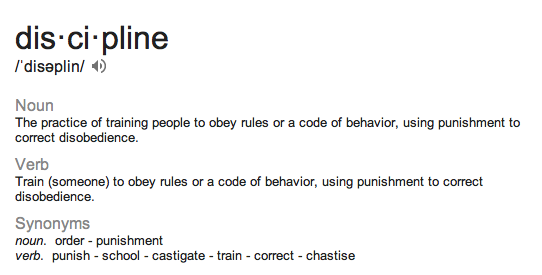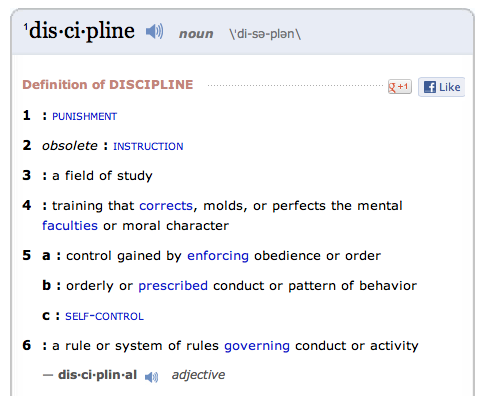By: Martin Grunburg
Regarding matters of discipline…
Don’t buy into the hype. One of the great benefits of coaching and working with people is gaining more insight and understanding about self-imposed limitations, belief systems and more often than not, the main source of personal frustration is self-limiting language (self-talk).
Self-talk is so often responsible for the great divide among “achievers” and “non-achievers.” I’ve used this quote before but it applies here once again: “The beginning of wisdom is to call things by their correct name.” Chinese Proverb
Because so many people misunderstand HABIT they cannot even begin to apply it in the constructive manner it was intended. Similarly, because so many people misunderstand DISCIPLINE they are often left on the outside looking in—thinking/believing that they just don’t have what it takes to be “successful.”
The other day I was at a networking event and a Karate instructor was proclaiming the virtues of DISCIPLINE. In fact, he was handing out bracelets that were inscribed “I’m Disciplined.” He continued to talk about the concept and how he believed the difference between successful people and unsuccessful people was simply the BIG “D.” Now, if you’ve read The Habit Factor you know what I think about that. ; )
He went on and described discipline as (and I’m certainly familiar with this quote—it’s a good one): “The ability to do what you ought to do, when you ought to do it, whether you feel like it our not.” (I believe that is Ziglar original)
Anyhow, and unfortunately, that is NOT the real or even an accurate definition of the word as much as I like its descriptive nature.
Below are a couple of screen shots borrowed from Dictionary.com and Merriam-Webster.com. My hope is that once you read/review these definitions you may see the very real challenge they provide and how each might further hamper those who have already come to believe that they “aren’t disciplined” or “don’t have the discipline” to achieve their goals.


The practice of training people to obey rules or a code of behavior, using punishment to correct disobedience.
PUNISHMENT. OBEY. TRAINING. (sounds like a party, huh?)
I managed to make it to the end of Karate guy’s presentation and then, during the Q&A, I just couldn’t hold out any longer and chimed in, “The BIG ‘D’ as I’m sure you know is a scary word to many people, don’t you think? It’s a bit like telling someone who’s already insecure and unsure of themselves and their capabilities that they need to take ‘massive action’ to achieve their goals.” [As much as I love the message and the man behind it— I’m certain it scares a good majority of people. Yet, coaches around the world reiterate it.]
So, whether you are a coach or not, when it comes to discipline, here’s a simple idea: AVOID IT ENTIRELY!
Here’s why (try to fill in the blank). DISCIPLINE is really just a H __ __ __ __ (rhymes with rabbit)
That’s correct, HABIT.
And, just like any ingrained character trait, it becomes a habit. That is why one of the definitions of HABIT is character. So, by focusing on The Habit Factor process (i.e., NOT discipline or the need for discipline) and developing and improving any particular behavior’s HabitStrength™, discipline becomes a RESULT (as it should be) and a bi-product vs. a means to an end.
A lot easier and certainly more fun than punishment.
This is why, when I nudged Mr. Karate a little further to suggest that what we’re talking about is HABIT and really just BABY steps, he then concurred, “You know, there is this great quote, I can’t remember who said it, “Excellence is not a single act but a habit.”
To which I replied, “yes, Aristotle.” with a smile.
So, please know that it sounds a bit crazy at first for me to say to clients that they don’t need to worry about discipline. But, the reality is THEY/YOU don’t.
Now, as long as I have your attention, there is another way to crush/eliminate the need for discipline, and it starts with the letter “P.”
Let me pose a couple of scenarios for you first.
An 18-year-old young man gets up every morning at 7 a.m. to play the piano.
Question: Is he disciplined?
Now take that same young man and just switch the activity. Let’s consider he’s now playing Ninetendo, XBox or Wii.
Question: Is he disciplined? Or, is he a derelict? A bum or a drifter?
Is there a common thread?
Well, you won’t have to dig too deep to identify that the common thread is likely PASSION. Passion trumps discipline any and every day. Think about it: If you were passionate about running, and many people are, do they need to be disciplined? If you were passionate about eating good foods, would you need to be disciplined? If you were passionate about writing, would you need to be disciplined to write everyday or would you be excited to?
So, the way to circumvent the big “D” is either with passion or, with small, incremental steps to guide the development of habit. You choose.
This post (again) is too long so I’m pushing out Part III of habit development. Stay tuned and forget about discipline. Use the FREE tracking sheet from the link above that says “Templates”. Good Luck!
-mg